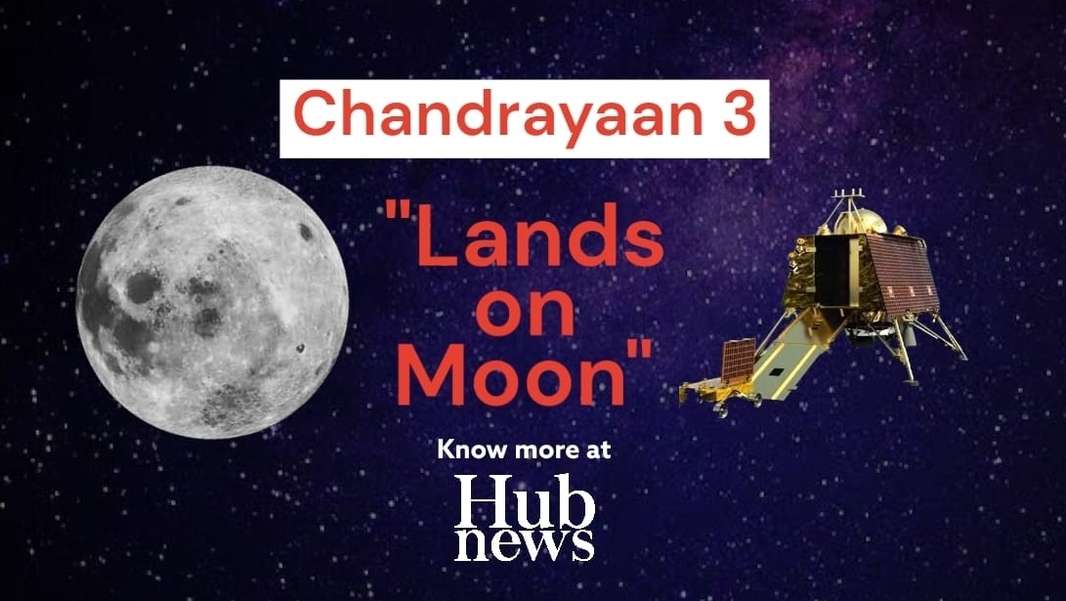By-Neha Singh
Shillong, Aug 24: August 23, a day when the scientists of the Indian Space Research Organisation (ISRO) made history, when all their hard work, dreams, hopes, and emotions turned into reality after the Chandrayaan-3 lander successfully touched down on the south pole surface of the Moon.
Chandrayaan-3, which in Sanskrit means Mooncraft,” touched down shortly after 6 p.m. India time (12:30 GMT).
With this, India became the fourth country after the US, Russia, and China to touch down on the lunar surface.
But it must be noted that with this, India also became the first country in the world to land near the lunar south pole.
As the countdown started for Chandryaan-3 to land on the moon’s surface, the world’s eyes were on India after the crash of Russia’s Luna-25.
Chandrayaan-3 lands on Moon: As it happened:
Chandrayaan-3 Rover, which was made in India for the moon, ramped down from the Lander and took a walk on the moon after a successful landing.
Chandrayaan-3 Mission:
Chandrayaan-3 ROVER:
Made in India 🇮🇳
Made for the MOON🌖!The Ch-3 Rover ramped down from the Lander and
India took a walk on the moon !More updates soon.#Chandrayaan_3#Ch3
— ISRO (@isro) August 24, 2023
The communication links were established between the Ch-3 Lander and MOX-ISTRAC, Bengaluru.
The images from the Lander Horizontal Velocity Camera taken during the descent were also shared.
Chandrayaan-3 Mission:
Updates:The communication link is established between the Ch-3 Lander and MOX-ISTRAC, Bengaluru.
Here are the images from the Lander Horizontal Velocity Camera taken during the descent. #Chandrayaan_3#Ch3 pic.twitter.com/ctjpxZmbom
— ISRO (@isro) August 23, 2023
A portion of Chandrayaan-3’s landing site, a leg and its accompanying shadow can also be seen. Chandrayaan-3 chose a relatively flat region on the lunar surface.
Chandrayaan-3 Mission:
The image captured by the
Landing Imager Camera
after the landing.It shows a portion of Chandrayaan-3's landing site. Seen also is a leg and its accompanying shadow.
Chandrayaan-3 chose a relatively flat region on the lunar surface 🙂… pic.twitter.com/xi7RVz5UvW
— ISRO (@isro) August 23, 2023
The lander captured the moon on August 20 with the Lander Imager Camera 4.
…. and
The moon as captured by the
Lander Imager Camera 4
on August 20, 2023.#Chandrayaan_3 #Ch3 pic.twitter.com/yPejjLdOSS— ISRO (@isro) August 22, 2023
The Lunar far side area was captured by the Lander Hazard Detection and Avoidance Camera (LHDAC).
Chandrayaan-3 Mission:
Here are the images of
Lunar far side area
captured by the
Lander Hazard Detection and Avoidance Camera (LHDAC).This camera that assists in locating a safe landing area — without boulders or deep trenches — during the descent is developed by ISRO… pic.twitter.com/rwWhrNFhHB
— ISRO (@isro) August 21, 2023
Chandrayaan-3 Mission:
🌖 as captured by the
Lander Position Detection Camera (LPDC)
on August 15, 2023#Chandrayaan_3#Ch3 pic.twitter.com/nGgayU1QUS— ISRO (@isro) August 18, 2023
Chandrayaan-3: What’s next?
After landing successfully on the moon’s surface, the six-wheel, 26-kg rover, capable of slowly moving up to 500 metres, will start the job of lunar exploration. Now the lander and rover will start collecting data soon after to get as much science as possible in the single lunar day or 14 Earth days for which they will remain operable.

The Chandrayaan-3 payloads will also learn about the two predecessor missions by studying lunar quakes, mineral compositions, and the electrons and ions near the surface of the moon. The mission will attempt to study water ice, whose presence was detected by Chandrayaan-1.
Previous attempts
Earlier in 2019, India made an attempt to land on the lunar south pole but failed. Despite this, India’s Chandrayaan-2 successfully deployed an orbiter, but its lander and rover were destroyed in a crash.
Why was this landing very important for India?
According to Carla Filotico, a consultant at SpaceTec Partners, the landing of Chandrayaan-3 on the moon is “very important” for India.
It is said that this successful mission will help India demonstrate its “technological advancement”.
This will help India explore the water and ice on the moon.
It will also help in accumulating data on the science and geology of the moon and gathering information on the exploration of the solar system’s history and evolution.

How will this help politically?
Modi’s government is planning to invest in private space launches and related satellite-based businesses.
Within the next decade, India wants its private space companies to increase their share of the global launch market fivefold.
Earlier, PM Modi had said that when the moon mission was launched, ISRO was writing “a new chapter in India’s space odyssey” and elevating “the dreams and ambitions of every Indian”.
WATCH:
Find latest news from every corner of Northeast India at hubnetwork.in, your online source for breaking news, video coverage.
Also, Follow us on-
Twitter-twitter.com/nemediahub
Youtube channel- www.youtube.com/@NortheastMediaHub2020
Instagram- www.instagram.com/nemediahub





